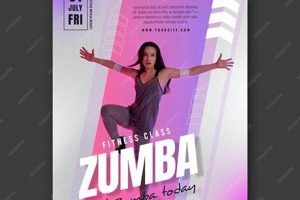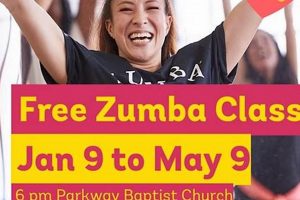The pursuit of free or low-cost methods for acquiring Zumba instructor certification is a common interest among aspiring fitness professionals. It reflects a desire to enter the Zumba field without incurring significant upfront expenses often associated with formal training and licensing. Understanding the viable pathways is crucial for those seeking to leverage the global popularity of Zumba for professional opportunities.
Pursuing this path offers advantages such as reduced financial burden and increased accessibility to professional development. Historically, fitness certifications have presented a barrier to entry for some individuals. Exploring alternative strategies can broaden participation in the fitness industry, fostering a more diverse and inclusive pool of instructors. The ability to teach Zumba offers opportunities for employment, community engagement, and personal fulfillment.
The subsequent sections will delve into readily available resources, strategies for acquiring practical experience, and potential avenues for obtaining Zumba instructor certification support. This exploration will illuminate the complexities and possibilities inherent in this pursuit. The article emphasizes alternative approaches that are not officially endorsed by Zumba Fitness, LLC.
Strategies for Reduced-Cost Zumba Instructor Training
The following strategies outline potential methods for mitigating expenses associated with Zumba instructor certification. It is essential to note that some may not lead to official certification but can provide valuable experience and knowledge.
Tip 1: Leverage Community Resources: Engage with local community centers, gyms, or fitness studios to inquire about potential apprenticeship opportunities or discounted training programs. These establishments sometimes offer programs for aspiring instructors in exchange for volunteer work or other contributions.
Tip 2: Seek Scholarship or Grant Opportunities: Research available scholarships or grants from fitness organizations or community foundations. Some organizations offer financial assistance to individuals pursuing fitness certifications, including Zumba.
Tip 3: Focus on Foundational Fitness Knowledge: Develop a strong base in general fitness principles, such as anatomy, physiology, and exercise science. This knowledge can be acquired through free online courses, library resources, or self-study. Understanding these concepts enhances teaching abilities, even without formal Zumba certification.
Tip 4: Network with Certified Instructors: Connect with certified Zumba instructors in the area and offer assistance during their classes. Shadowing instructors, assisting with setup, or handling administrative tasks can provide valuable insights into Zumba teaching methods and studio operations.
Tip 5: Utilize Online Resources (with Caution): Explore free online resources, such as YouTube tutorials or fitness blogs, for Zumba choreography and teaching tips. However, exercise caution and ensure the information comes from reputable sources. Online resources cannot substitute for formal training.
Tip 6: Explore Government-Funded Training Initiatives: Investigate if local or national government offers programs to help people re-train or learn new skills, which may include training that would be beneficial to becoming a Zumba instructor, or cover associated costs.
These strategies can aid in gaining relevant knowledge and experience while minimizing financial investment. However, it is crucial to recognize that official Zumba certification requires completing a Zumba Fitness, LLC, approved training course.
The subsequent section will address alternative career paths that can leverage skills acquired through these strategies. These may include related fitness instruction or community fitness leadership roles.
1. Self-Study
Self-study, in the context of aspiring to become a Zumba instructor without incurring expenses, represents a foundational, albeit incomplete, approach. It entails the independent acquisition of knowledge and skills related to dance fitness, exercise principles, music rhythm, and choreography. While self-study alone cannot confer official Zumba certification, it can significantly enhance an individual’s understanding and preparedness for future formal training or alternative career paths within the fitness industry. The effectiveness of self-study is contingent upon the discipline and commitment of the individual, as well as the quality and reliability of the resources utilized.
The importance of self-study lies in its ability to establish a baseline level of competence. For instance, an individual might utilize free online resources to learn basic dance steps, musicality principles, and fundamental fitness movements that are prevalent in Zumba. This prior knowledge can reduce the learning curve when formal training is undertaken at a later stage. Furthermore, self-study can inform a potential instructor’s decision-making process. By exploring the core elements of Zumba instruction independently, an individual can better assess their aptitude and passion for the field before investing in costly certification programs.
However, it is crucial to acknowledge the limitations of self-study. Without official Zumba instructor training, it is impossible to legally teach Zumba classes under the Zumba Fitness, LLC, brand. Self-study, therefore, should be viewed as a complementary tool for individuals seeking alternative fitness instruction roles, such as leading community dance fitness classes or developing personal fitness routines for friends and family. While the possibility of teaching Zumba classes for free does not substitute a Zumba Certification, the understanding of fitness and dance principles can be applicable to other activities and skill-sets.
2. Community resources
Community resources can represent a pivotal, though often indirect, pathway in the pursuit of becoming a Zumba instructor without incurring significant financial outlay. The connection resides in the capacity of these resources to provide foundational knowledge, practical experience, and networking opportunities that can reduce the barriers to entry into the fitness instruction field, if not directly lead to Zumba certification. Understanding the value of community resources is important as a component of how to become a Zumba instructor for free, as the cost of official training can often be the primary factor. For example, local community centers, recreational departments, or non-profit organizations might offer free or low-cost dance or fitness classes. Participation in these activities cultivates essential skills such as rhythm, coordination, and class leadership, forming a base upon which Zumba-specific training can be built, potentially reducing the need for extensive and costly introductory Zumba courses later on.
Moreover, community resources frequently facilitate networking opportunities. Attending fitness events or volunteering at local gyms can connect aspiring instructors with established professionals who may offer mentorship, guidance, or even opportunities to shadow Zumba classes. These interactions are invaluable for gaining insights into the practical aspects of teaching, developing a professional network, and potentially identifying avenues for reduced-cost or subsidized Zumba certification programs. The practical significance lies in the potential to access information and support that is not readily available through traditional channels, therefore providing individuals with alternative and cost-effective pathways.
In summary, while community resources do not directly confer Zumba instructor certification, they play a crucial role in equipping aspiring instructors with essential skills, knowledge, and connections. These, in turn, reduce the financial burden of formal training and enhance their prospects for success within the fitness industry. The challenge lies in proactively identifying and leveraging available community resources and supplementing them with self-directed learning and professional networking to overcome the limitations of not having a Zumba Fitness, LLC recognized certificate.
3. Skill exchange
Skill exchange, in the context of pursuing Zumba instructor training at no cost, represents a barter system where individuals offer their existing expertise or services in exchange for Zumba instruction or related benefits. This methodology can bypass the financial barriers associated with formal certification programs.
- Bartering Fitness Knowledge
Individuals possessing expertise in other fitness disciplines, such as yoga, Pilates, or strength training, may offer to teach classes or provide personalized training sessions to certified Zumba instructors or studios in exchange for Zumba instruction or shadowing opportunities. This reciprocal arrangement leverages existing skills to gain access to desired training.
- Offering Administrative or Marketing Support
Aspiring instructors with skills in administrative tasks, marketing, or social media management can provide these services to Zumba studios or instructors in exchange for discounted or free Zumba training. This mutually beneficial arrangement allows studios to offload tasks while providing training access.
- Providing Childcare Services
Individuals with childcare experience can offer their services to Zumba instructors during classes or training sessions in exchange for participation. This facilitates accessibility for parents seeking Zumba instruction and provides the instructor with valuable support.
- Technical Assistance
Individuals skilled in areas such as website design, video editing, or audio engineering can offer their services to Zumba instructors to create promotional materials, edit class recordings, or manage technical aspects of their business in exchange for training opportunities.
The efficacy of skill exchange as a means of accessing Zumba instructor training hinges on the value and demand for the skills offered, as well as the willingness of certified instructors or studios to participate in such arrangements. While not a guaranteed path to free certification, skill exchange presents a viable alternative for those seeking to leverage their existing abilities to pursue Zumba instruction.
4. Volunteer assistance
Volunteer assistance represents a potential avenue for individuals seeking to gain experience and knowledge in Zumba instruction without incurring direct financial costs. It involves offering one’s time and skills to existing Zumba instructors or studios in exchange for learning opportunities and exposure to the Zumba environment. While it does not directly confer Zumba certification, it can provide valuable experience. How to become a Zumba instructor for free involves such methods of learning which is a common interest.
- Class Preparation and Setup
Volunteering to assist with class preparation, including setting up equipment, music, and the studio space, provides insight into the logistical aspects of running a Zumba class. This exposure can enhance understanding of class structure, music selection, and cueing techniques, contributing to a broader understanding of the role.
- Assisting Participants
Offering assistance to participants during Zumba classes, such as demonstrating modifications or providing encouragement, can develop communication and interpersonal skills essential for effective instruction. Observing participant responses and adapting techniques accordingly provides hands-on experience in catering to diverse fitness levels.
- Administrative Support
Providing administrative support to Zumba instructors or studios, such as managing class registrations, handling client inquiries, or assisting with marketing efforts, offers insights into the business side of Zumba instruction. This can contribute to an understanding of studio operations, marketing strategies, and client management, which are valuable skills for aspiring instructors.
- Choreography Assistance
Experienced dancers or fitness enthusiasts may volunteer to assist Zumba instructors with choreography development. This could involve suggesting new routines, refining existing choreography, or providing feedback on music selection. Such participation offers opportunities to explore creative aspects of Zumba instruction and learn about music-movement synchronization.
The value of volunteer assistance lies in its ability to provide practical experience and networking opportunities that can enhance an individual’s prospects of eventually pursuing formal Zumba certification or securing related fitness instruction roles. While not a substitute for certified training, volunteering allows for immersion in the Zumba environment and the development of relevant skills. Aspiring instructors should carefully consider the time commitment and potential benefits before engaging in volunteer work, ensuring that the experience aligns with their overall career goals.
5. Unpaid experience
Unpaid experience, while not a direct substitute for formal Zumba certification, represents a strategic approach for individuals seeking entry into the fitness industry, particularly those interested in the pursuit of Zumba instruction without immediate financial investment. It serves as an avenue to acquire practical skills, industry insights, and networking opportunities, ultimately enhancing competitiveness and preparedness for future professional endeavors. This exploration elucidates the facets of unpaid experience relevant to the theme “how to become a Zumba instructor for free.”
- Skill Development and Refinement
Unpaid opportunities, such as assisting established instructors, allows for the observation and practice of key instructional techniques. This includes cueing, choreography adaptation, class management, and participant engagement. While not compensated monetarily, this hands-on experience provides invaluable learning that complements self-study and formal training, fostering a deeper understanding of Zumba instruction principles.
- Industry Networking and Mentorship
Volunteering or interning with Zumba studios or instructors provides access to a professional network. These connections can lead to mentorship opportunities, guidance on certification pathways, and potential future employment prospects. Exposure to industry professionals facilitates the acquisition of tacit knowledge, such as marketing strategies, client retention techniques, and studio management practices, which are essential for a successful Zumba career.
- Portfolio Building and Credibility
Documenting unpaid experience on a resume or professional profile demonstrates a commitment to the fitness industry and an eagerness to learn. Providing detailed descriptions of responsibilities, skills acquired, and contributions made enhances credibility and distinguishes aspiring instructors from individuals with limited practical exposure. This record of unpaid engagement can be leveraged when seeking paid employment or scholarship opportunities.
- Access to Training and Resources
Some unpaid positions may offer access to internal training programs, studio resources, or discounted certification opportunities. For instance, volunteering at a Zumba studio could provide access to internal choreography workshops or reduced rates on Zumba Basic 1 certification. These benefits, while not guaranteed, can significantly reduce the financial burden of becoming a certified Zumba instructor.
The strategic utilization of unpaid experience serves as a supplementary method to acquire necessary skills and gain industry entry. By engaging in unpaid roles, individuals can enhance their competitiveness, expand their professional network, and potentially access resources that facilitate their pursuit of formal Zumba certification and career advancement. Even if obtaining certification for free is unachievable, unpaid experience enables candidates to better prepare themselves for the Zumba job market.
Frequently Asked Questions
The following section addresses common inquiries regarding the possibility of acquiring Zumba instructor certification without incurring expenses. The information presented aims to provide realistic expectations and clarify potential pathways.
Question 1: Is it truly possible to become a certified Zumba instructor without paying for training?
Direct certification through Zumba Fitness, LLC, invariably requires completion of a paid training course. While alternative strategies can reduce the overall cost or provide valuable experience, the official certification process involves a fee.
Question 2: What alternative methods can reduce the cost of becoming a Zumba instructor?
Strategies such as leveraging community resources, pursuing scholarships or grants, networking with certified instructors, and utilizing free online resources can mitigate expenses. However, these methods do not circumvent the requirement for formal Zumba training for official certification.
Question 3: Can skills acquired through self-study or volunteer work substitute for formal Zumba training?
Skills gained through these avenues are valuable and can enhance teaching abilities. However, Zumba Fitness, LLC, requires completion of its authorized training program to obtain certification and legally teach Zumba classes under the Zumba brand.
Question 4: Are there any legitimate ways to obtain a free Zumba certification online?
No. Zumba Fitness, LLC, does not offer free online certification programs. Any claims of free certification should be regarded with extreme skepticism and investigated thoroughly.
Question 5: What is the role of networking in reducing the cost of Zumba certification?
Networking can provide access to mentorship opportunities, industry insights, and potential leads on scholarships or discounted training programs. Establishing relationships with certified instructors and studio owners can open doors to various cost-saving avenues.
Question 6: If free Zumba certification is not possible, what are alternative career paths that leverage similar skills?
Alternative careers include teaching general dance fitness classes, leading community fitness programs, providing personal training services focusing on dance-based workouts, and developing online fitness content.
In summary, while the pursuit of free Zumba certification is unrealistic, various strategies can minimize the financial burden and provide valuable experience. The focus should be on acquiring relevant skills and knowledge through available resources while recognizing the requirements for official certification.
The following section explores the importance of continuous professional development for Zumba instructors and other fitness professionals.
Conclusion
This exploration has addressed the aspiration of becoming a Zumba instructor with minimal or no financial investment. It has outlined strategies such as leveraging community resources, pursuing skill exchanges, and undertaking self-study. While these approaches offer valuable experience and knowledge, they do not substitute the formal training and certification required by Zumba Fitness, LLC. Official Zumba instruction necessitates completing their approved programs.
Aspiring instructors should recognize the complexities and limitations inherent in pursuing Zumba certification entirely free of cost. A strategic approach, combining resourcefulness with realistic expectations, is paramount. Though the path to free certification may be unattainable, the pursuit of related skills and experience can enhance opportunities within the broader fitness landscape. Prospective instructors should carefully consider their goals and resources before embarking on this journey. The fitness landscape is continuously evolving, so keep abreast of industry changes to remain competitive.




![Find FREE Zumba Classes Near Me for Ladies - [Location]! The Ultimate Zumba Guide: Dance Your Way to a Healthier You Find FREE Zumba Classes Near Me for Ladies - [Location]! | The Ultimate Zumba Guide: Dance Your Way to a Healthier You](https://mamazumba.com/wp-content/uploads/2025/10/th-896-300x200.jpg)


